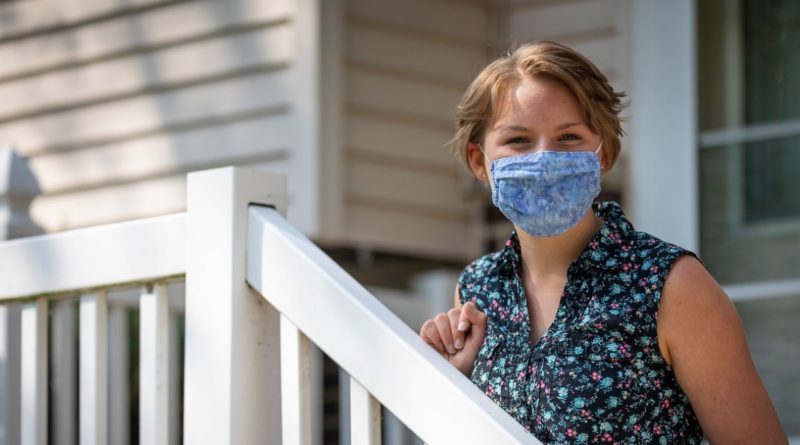As Flu Season Looms, Some Worry About False COVID-19 Symptoms
Emma Davenport is on the Schaumburg High School golf team, even though just being outside this time of year wreaks havoc on her allergies.
Here’s what they feel like.
“It starts with like a junkiness in kind of my chest, and a scratchy throat,” said Davenport, 17. “My eyes are watering, my ears feel like they’re plugged and I have a headache. Then my nose starts running. It’s really not a pretty picture.”
In the back of her mind, Davenport said she wonders — are these just her typical allergies, or is she getting the flu? Or worse, is she getting COVID-19?
“I feel like I’m walking on eggshells just anxious about how I’m feeling and what that actually looks like,” Davenport said.
Six months into the pandemic, people remain anxious that every little cough and sneeze could be a sign of COVID-19. Now add seasonal allergies and the flu to the mix heading into fall and winter. Plus, people are getting out of the house more. Some kids are back in school. Others are in day care or in sports camps.
Cue the anxiety and confusion.
Every time those kids even get a cold, their parents might wonder: Do they need to get tested for COVID-19? And can it be a cheek swab rather than a brain poke?
The guidance on this continues to change. The CDC on Friday issued guidelines suggesting that anyone who comes into contact with another person who has COVID-19 should get a test, whether or not they have symptoms. That’s a departure from their guidelines in August, which said unless people came into close contact with people with COVID-19, tests weren’t necessary. (The CDC has already suggested people who have what could be symptoms of the coronavirus get tested.)
But it’s still largely a subjective question, if you’re not sure those symptoms truly could be COVID-19.
In north suburban Glenview, Carie Radford’s husband and 5-year-old son have allergies. She jokes they keep Costco in business with the amount of Kleenex boxes spread throughout the house, and even more stocked in cabinets.
COVID-19 is “on the top of our mind like the minute somebody coughs or sneezes,” said Radford, 42. “It’s definitely like, OK, … do you think we’re getting sick or is it just still allergies?”
Teresa Fraga in Chicago’s Pilsen neighborhood on the West Side is 77 years old and her husband is 84. That puts them at high risk of getting both the flu and COVID-19. Fraga said she got nervous recently after being interviewed outdoors near her home to be part of a mural.
“When I came back inside I said, ‘My God, I stood out there a whole hour,’” Fraga said. “What if I start feeling cold or I’m still feeling runny nose or whatever?”
She said she’s really worried about the winter, about what she might actually have if she gets sick. She’s already keeping her distance from relatives who live next door and across the alley.
Get a flu shot yet?
Doctors say anxiety and confusion is understandable. After all, the symptoms for allergies, flu and the coronavirus are so similar.
“I always tell patients and employees you need to look into your body,” said Dr. Jennifer Vargas, medical director at Alivio Medical Center, which has health centers on the West and Southwest sides. “If you’re starting to feel something different, you generally have a history of allergies, but now you’re having shortness of breath, which you never had before, or you’re having body aches and muscle aches and a fever and chills, we tell them, ‘Well that doesn’t sound like it’s your typical allergies.’”
That’s when she said it’s time to call the doctor.
One of the things physicians say may help reduce this anxiety is to try to help prevent people from getting the flu. They’re pushing flu vaccinations, hoping to reduce at least one of the causes of those fevers — and confusion over whether someone might have COVID-19.
Even if they don’t have flu shots in the office yet, some doctors say they’re already getting calls from anxious patients.
“The last time I saw this sort of demand for the flu vaccine was back when the swine flu 10 years ago,” said Dr. Paul Luning, chief medical officer at PCC Wellness, a group of health centers on the West Side and in the western suburbs.
Still, some people remain reluctant about getting a flu shot. Luning said he has some patients who don’t even want to discuss it. Maybe they’re already beaten down, he said, by six months of anxiety over the coronavirus.
He points out there’s another group of patients who don’t think they need the flu shot because they’re avoiding people anyway. (They still do, he said.)
Physicians stress that there are other ways to reduce the confusion in the months ahead. Besides getting a flu shot, wash your hands often, stay 6 feet apart from people who aren’t in your COVID-19 bubble and wear a mask.
Kristen Schorsch covers public health on WBEZ’s government and politics desk. Follow her @kschorsch.




